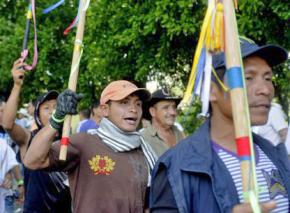The uprising in Catatumbo
explains the backdrop to the latest in a series of campesino protests.
AT THE mouth of the Catatumbo River that divides Colombia and Venezuela, a unique natural phenomenon takes place--every other night on average--above the marshlands where the river empties into Lake Maracaibo. Soon after dusk and continuing all night, the sky over this small area is filled with lightning--approximately 20,000 discharges per night. It's said that the Catatumbo lightning betrayed the English sea captain Sir Francis Drake when he tried to raid Spanish ports in the 16th century.
Today, further upstream, on the Colombian side of the Catatumbo, a different kind of storm is keeping that country sleepless.
Starting on June 10, 16,000 campesinos mobilized to the cities of Ocaña and Tibú to petition for the constitution of a Zona de Reserva Campesina (ZRC)--the legal designation for a region with a rural development plan. The protests are occurring in a region traditionally controlled by the FARC (Fuerzas Armadas Revolucionarias de Colombia), an armed insurgency that is close to half a century old.

The farmers are demanding that the government reduce eradication of coca--a traditional crop in the region that has been targeted for elimination, under pressure from the U.S. government--unless it also provides assistance for cultivating other crops.
The return on 1 kilogram of coca leaves is 1,500 times larger than on 1 kilogram of cacao. Legal crops are not economically viable due to a variety of free trade agreements that Colombia has signed, including with the U.S., that have depressed the price for agricultural commodities. For campesinos, growing coca remains the only way to stay afloat in a difficult economic environment.
On June 22, riot police fired at the protesters, leaving four dead and 50 injured. Peasant leader Cesar Jerez announced the existence of videos that he says prove the responsibility of police in the death of two protesters. At least 10 police agents were injured in the June 22 confrontation.
The government insinuates that the FARC is behind the protests. If so, this dispels the idea claimed by the U.S.-backed Colombian government that the group has little support among peasants.
There have been attempts to negotiate a deal. Peasant leaders had agreed to meet in the Colombian capital of Bogotá, but they eventually cancelled after President Juan Manuel Santos refused to confirm his presence at the meeting. The campesinos refused to negotiate with Luis Eduardo Garzón, the former mayor of Bogotá.
THIS IS the latest in a series of peasant strikes that have paralyzed the economy in different regions of Colombia. A historic strike by coffee and cacao growers early this year interrupted the flow of goods to the port of Buenaventura and to the southwestern border with Ecuador. Since then, lower-visibility strikes affecting rice, sugar and potatoes have taken place through the mountain regions until reaching the Colombian Catatumbo on the border with Venezuela.
The path taken by this chain of strikes covers the most densely populated areas of the country--indicating that Colombia is experience an upturn in popular struggle, contrary to the image of an investment-safe haven that the government wishes to portray.
The grievances of the campesinos is related to the commitment of the Santos administration to direct Colombia's economy toward mining. In addition to producing unfavorable economic conditions, this extractive industry damages the environment in areas struggling communities live.
In negotiations with the Colombian government held in Cuba, the FARC proposed the creation of 59 ZRC--only six exist at present. On May 26, FARC and government representatives announced that they had reached agreement on agrarian questions. The expectations of the peasantry have risen since then. But the government's brutal reaction to the peasant uprising bodes ill in terms of the government's actual commitment on the agrarian question.
El Relámpago del Catatumbo (Catatumbo Lightning) has illuminated the region for millennia. As government negotiations with the FARC continue in Havana, the Catatumbo uprising further upriver is shining a light on the government's attitude towards the peasants of Colombia.


